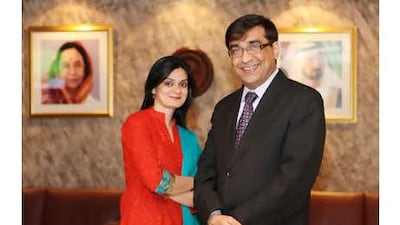"When you can't read or write in your mother tongue, and you don't have an official state, your cuisine becomes an important part of your cultural identity" says Bharat Chachara. "We are often referred to as the 'sandwich generation'. Many people of my age were born in the Gulf and grew up here, yet we are, of course, Indian." Chachara, the general manager of the India Club in Dubai, and his wife Deepa are the authors of Panja Khada (Our Food), the first ever collection of recipes recording the distinctive cuisine of the Thathai Bhatia community. Following its publication in 2002, the book has gone on to become a local bestseller and now, in response to its popularity, its recipes can be viewed online via a new website, www.panjakhada.com.
The cooking style of the Thathai Bhatias is unique for a number of reasons: not only is their diet strictly vegetarian, but the use of onion and garlic - staple ingredients in much Indian cookery - is also forbidden. This is because before being eaten, food was traditionally presented as a religious offering, and the presence of pungent flavours was believed to render it impure. Instead of onion and garlic, the main condiments/flavourings are asafoetida (hing) and cumin (jeera), spices that are thought to have medicinal properties and aid digestion. Vegetables are a main basic ingredient, namely aubergine (baingan), courgette (turai) and bitter gourd (karela), and the cuisine tends to be more delicate and uses simpler garnishes (for example, chopped coriander or a squeeze of lemon) than a lot of Indian cooking. Popular dishes include dar-palka (lentils with spinach) and teedali poath (three-lentil curry).
The concept of the cookbook was born out of Chachara's long-held desire to help preserve the unique culture of the Thathai Bhatias, who, by one estimate, number just 10,000 worldwide. Originating from Rajasthan in northern India, they first settled in the province of Sind (now in Pakistan) in the 15th century. Their emigration to the Gulf region began as far back as 150 years ago when a small trading community was established in Sharjah, and during the tumultuous political environment that ensued post-partition, many more left to settle in the region. Chachara's father moved to Bahrain in 1957, where Chachara was born and brought up. He himself moved to Dubai in 1996.
As a result of their nomadic past, the history of the Thathai Bhatia is not well documented and Chachara says he feared that once his own generation passed, the cultural identity of the community would be lost forever. With this in mind, he began to make a record of traditional ingredients and recipes and several years later, and with the essential help of Deepa, the book was completed. Its publication was no small achievement; the couple both had full-time jobs at the time and they faced many difficulties in compiling the recipes, not least because of the oral nature of the cuisine's history.
"We wrote the recipes from memory, recalling tastes from childhood and the cooking methods of our mothers and grandmothers," says Chachara. "The difficulty with this, of course, was that they cooked by instinct, adding a pinch of one spice and a sprinkling of another. We had to approximate what we had seen and tasted." It was Deepa who took on the long and laborious task of cooking all the dishes, testing them for consistency and painstakingly recording the results. As with food all over the world, every family has a specific way of preparing a traditional dish and inevitably all believe that their method is the right one. So although the Chacharas knew some of their recipes might cause a certain degree of controversy among fellow Thathai Bhatias they welcomed this. Far from setting out to produce a definitive rule book, it was their intention to get people talking about, and experimenting with, their food.
After its publication, the couple became aware of a growing international interest in the book and so set about making it available to a global community. The launch of their website is the culmination of this work. Launched by the Consul General of India to Dubai and supported by local Bhatia businesses, the website contains more than 150 authentic recipes and provides information about traditional culinary terms, equipment and ingredients. It also gives a short history of the Bhatia people.
Through the website, the Chacharas' initial idea has been taken to a new level; it is now an open project that allows individuals to actively record, and contribute to, their own shared history. The couple are keen for people to post variations of recipes on the website, as well as share comments and feedback. There are also links to videos on YouTube, which demonstrate how to make various dishes. At the moment these are performed by Deepa and Bharat, but in the future they hope to film other members of the community and fans of the site cooking Thathai Bhatia-style food.
The website will be regularly updated with new recipes and followers will be alerted to this via Facebook and Twitter. The idea for Panja Khada sprang from a desire to create a lasting legacy and was motivated by Bharat Chachara's belief that "if you have knowledge, it is only right to pass it on and give something back". He and his wife can rest assured that they have certainly done that. To view the recipes and for more information on the project, see www.panjakhada.com.

